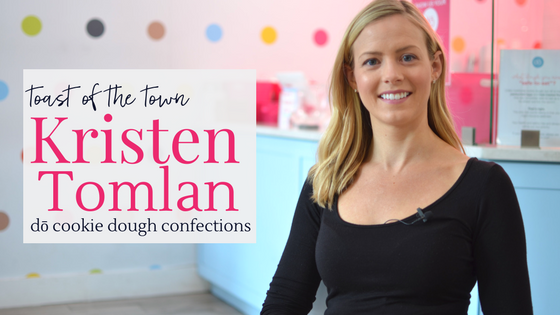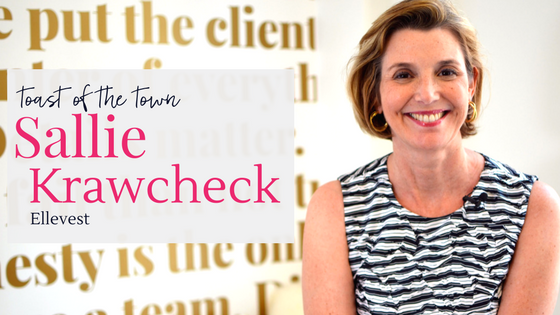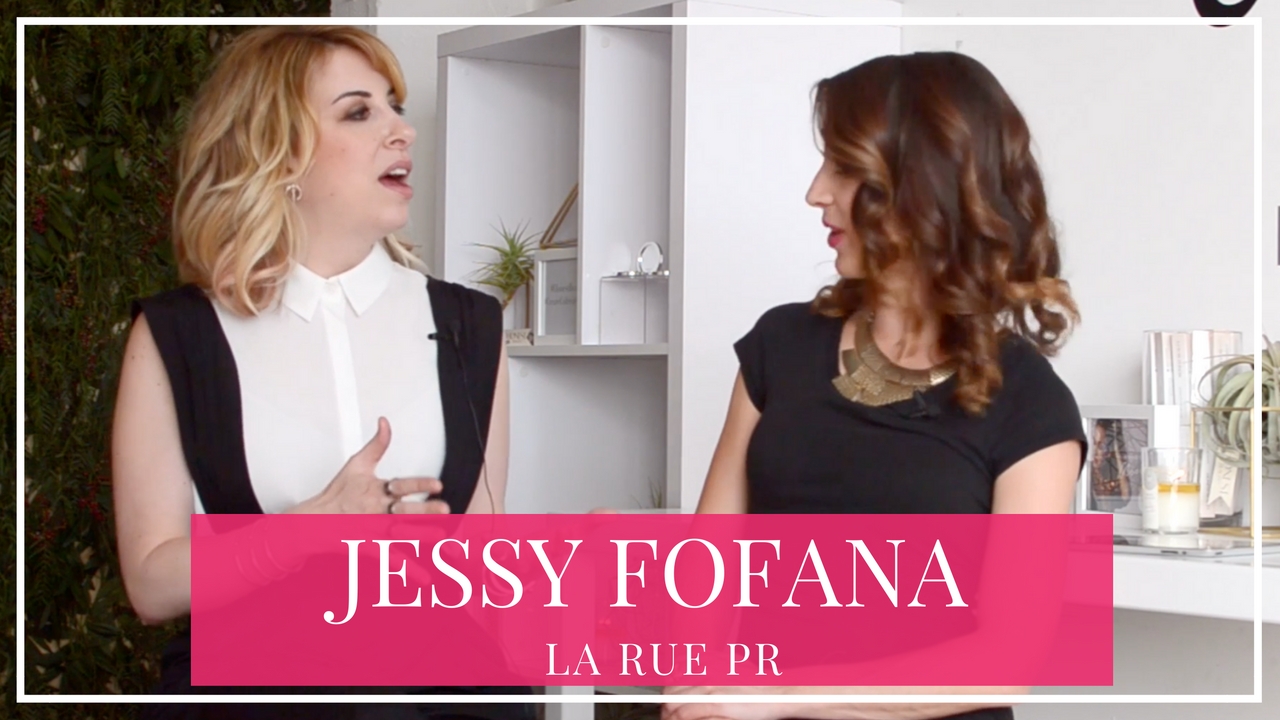An interview with Kristen Tomlan | Founder of DŌ Cookie Dough Confections
Kristen Tomlan is the founder of DŌ Cookie Dough Confections. Her NYC shop sells gourmet, edible, bakeable cookie dough.
YES, you totally heard that right.
Edible
Cookie
Dough!!!
And, just like you would find at an ice cream shop, you can get dō served in a cup, cone, milkshake, or ice cream sandwich. It’s basically every foodie’s dream. One look at the line pouring out of her shop (sometimes it’s up to 4 hours long!) and there’s no questioning that this lady is on to something.
I sat down with Kristen to get the story behind the building of her brand and learn how she rose to the top of New York’s food obsessed scene.
You can totally watch our interview above or read below. Because just like at Kristen’s shop, you’ve got plenty of good choices.

Cue the DŌlicous Interview
Kristen Tomlan: When I opened this business, I had no idea, I thought I was going to be making cookie dough and that’s far from the case now. I had always loved cookie dough. It was something I kept eating, making, sneaking for years. There was a moment when I thought, ok, why has this not been done? I was with a bunch of girlfriends at a cookie shop in Philadelphia. We wandered over to the freezer section where they were selling the cookie dough for you to go home and bake. I grabbed the tub and I turned to my friends and I said, “I can’t finish this cookie dough, does anybody want to share it with me?”. I mean I could eat it all but I thought better to share! They all decided that they were in. So, we went to the car and we were just passing around this tub of cookie dough. We thought this is going to get us sick. I didn’t want to worry about that. I wanted to create a product and a brand that was centered around safe to eat cookie dough. I wanted to have the option to bake it and put whatever you want on it.
Jen Hacker: Did the idea sit in the back of your head for awhile or did you immediately act on it?
Kristen Tomlan: For a while it did just sit there and I kind of vetted with a lot of friends and coworkers. I was working in brand interior design consulting, so everybody I talked to I was telling ‘oh, I want to make a different cookie dough place”. And, everybody kept saying “oh, that’s a great idea”. It finally got to a point where I was running into people who were asking what was going on with the cookie business. And, I’m thinking, oh my God, I put in 60 hours a week at work, traveling, you know, just living my normal life. Then I thought, I hate those people who talk but never do something. So, I thought, well, if this is a really good idea, I’d have to start a business. The first thing was sitting down with my fiancé at the time Saturday nights, weekends and coming up with a business plan and working out all those things that we didn’t even know I was supposed to do.
Jen Hacker: So, what did your business plan look like?
Kristen Tomlan: Yeah, so first, I didn’t know anything about starting a business but what I did know was about branding, designs and baking. So, that’s where I started. Luckily, I had Chris as a partner. He’s a project manager who knew about timelines and budgets and inspection schedules. He also through through the financials of all the varieties that I was making. So, I started in the kitchen and designing the logo and thinking about the visual system. Then it just kind of grew from there. The one thing we didn’t have was operations experience running a store. So, we talked to some partners about it, and then actually decided to pause and launch online before we opened the store.

Jen Hacker: OK. So, talk about that a little because the way you actually started was that you spent a couple of years doing e-commerce…
Kristen Tomlan: Yes, I did. So, the concept in the business plan was for the store. Then we realized we didn’t have all the experience and the investment was kind of threw the roof. I didn’t want to be one of these businesses in New York that opens up with a great idea and then execution is flawed and it fails. So, I thought let’s really just test the market see what the response is, see what flavors are popular, just like continue to learn until I launched online. At the time, I though I didn’t quit my job. I thought, I can do this on the weekends. I can do this online. So, that’s kind of what we did, we moved kind of away from that business plan for store and turned it into an e-commerce site.
Jen Hacker: So, in doing that what were some of the things that you had to do in order to get the brand online?
Kristen Tomlan: Yeah, so basically, we had to figure out packaging and shipping. We had to figure out our pricing structure. I mean, every little thing that has to go with the brand. Honestly, it was more like logistics at that point. When I opened this business, I had no idea, I thought I was going to be making cookie dough but that’s, far from the case now.
Jen Hacker: You really signed up for the branding and baking part of it?
Kristen Tomlan: Yeah, that’s what I love, that’s kind of what I knew and that’s what the business is about. My focus was on making sure that the product was really delicious. I thought ok, the product will speak for itself and I can concentrate on other parts of the business.

Jen Hacker: Talk a little bit about Instagram because it is one of the reasons the brand has grown exponentially these past few years. How did you start to grow on it?
Kristen Tomlan: So, ok, cookie dough is delicious but it also goes really well with sprinkles and all the different flavor combinations. I wanted to make something that people will look at and want to share with their friends. And, that’s exactly what I did – you know, using the packaging and how we topped it with fun mixings. That was my goal from the beginning. I thought if I made it to Instagram then maybe people would do exactly that. And that’s what happened. So yeah it kind of happened organically. The store was also built around these Instagram moments because that was a lot of what the brand is built on. I wanted the experience to continue throughout the store so we have the polkadot wall, the neon signs and you know, parts here and there where people are constantly snapping photos. It just kind of helped, you know, drive the buzz.

Jen Hacker:What’s the process that you adopted from your previous work to actually sit down and figure out what the dō brand should be?
Kristen Tomlan: Yeah, so I had this idea for the name. I wanted it to be simple but I didn’t want it to be D-O-U-G-H. I wanted it to kind of be how the prefix in the dictionary looks – dō. And then with that, I thought ok I want some sort of like circular shape. I was playing with the fact that cookies are obviously circular and the containers that I was putting the dough in would be circular. The scoops are circular. So I started with a circular motif which then turned into polkadot. Then the line over the o turned into a sprinkled pattern. I was just thinking about what are ways to make it playful and colorful and really just fun. At the end of the day, I wanted people to just have this smile on their face. That’s what I wanted the brand to reflect, that’s all.
Jen Hacker: So, from someone who has done it and has built this what’s some of the best advice that you can offer to another concerned entrepreneur who want to start a brand?
Kristen Tomlan: Yeah. so, I would say a couple things; one, just do it, do something, make some sort of move in some direction towards what you want it. And also, just follow your path; for me I always thought this was gonna be great, this was gonna be great, I had always wanted to do this and this is how I feel it was going to be. Honestly a lot of people doubted when I said I wanted to open up retail shop but I just really felt like my gut was telling me that this was the next step. So I would say to all entrepreneurs everywhere, follow your gut and just ldo what you love and other people will love it too.
Jen Hacker: Well, let’s have a toast to you, cheers.

Ready to learn how to build your own brand? This post is for you.







